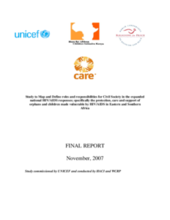There has been a broad and growing recognition of the need to intensify and accelerate actions towards universal access to comprehensive prevention, treatment, care and support. Commitment to attaining this goal by 2010 was affirmed by Heads of State and Governments and their representatives participating in the 2006 High-Level Meeting on AIDS held at the United Nations in New York, 31 May-2 June 2006 and by the declaration to this commitment by the AU heads of state in Abuja in the same year. This calls for the involvement and alignment of Orphans and Vulnerable Children (OVC) response activities towards a unified national effort to realize the target.
The aim of this study was to map the existing involvement of Faith Based Organizations (FBOs) and Civil Society Organizations (CSOs) in Orphans and Vulnerable Children activities in nine sample countries: Angola, Botswana, Lesotho, Malawi, Mozambique, Namibia, South Africa, Swaziland and Tanzania. Further, to propose mechanisms that will facilitate alignment of Orphans and Vulnerable Children responses by FBOs and CSOs to the national efforts. Lastly, to propose ways to enhance their contribution towards the realization of the universal access to essential services by the year 2010.
The report presents the current and suggested roles and responsibilities of CSO/FBOs in the expanded Orphans and Vulnerable Children response towards the realization of the targets for Universal Access to essential services by 2010. It is a synthesis of findings from the nine sample countries and country specific details are provided.

